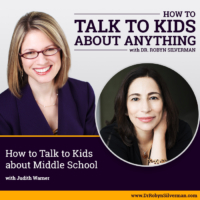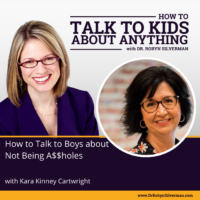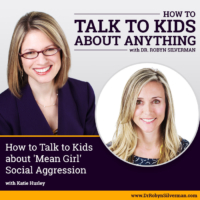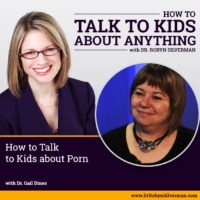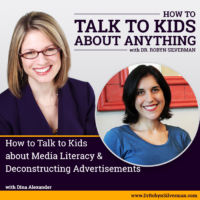Podcast: Play in new window | Download
Subscribe: Apple Podcasts | RSS | More
How to Talk to Middle Schoolers about What Matters Most

This podcast will focus on the key skills kids need to thrive in middle school and beyond as well as how parents and educators can help. In this interview with school counselor and psychotherapist, Phyllis Fagell, LCPC, author of Middle School Matters, we discuss how to talk to middle schoolers when so much is changing in their lives- physical, social, emotional—and when they are riding the line between needing their parents and wanting to individuate. How do we stay connected but also step back and allow them to shine? How do we shift our role to manager to coach? And how do we encourage our children to take risks in this low-stakes period of life when everything seems big, scary and consequential? Dr. Robyn Silverman and Phyliis Fagell discuss all that relates to middle school matters.
Special guest: Phyllis Fagell, LCPC
Middle school is a time of seismic shifts—everything is changing from friendships and relationships to hormones,  expectations and not to mention the physical, intellectual, moral, social and emotional growth your child is experiencing in just a short amount of time. Fundamental questions are floating around the heads of adolescents such as “who am I?” “Am I normal?” and “do I fit in?” Middle schoolers are thrust into a changing environment where adult involvement is reduced and their own skills become vital as they figure out exactly what they are going to allow to be their social and personal currency. Skills such as making good friend choices, negotiating conflict, considering other people’s perspectives, cultivating their own passions and recognizing limitations and of course, making responsible, healthy, ethical choices. Yes, there is a lot to this middle school experience that bridges the gap between childhood and teenhood—and thankfully, we don’t need to go it alone.
expectations and not to mention the physical, intellectual, moral, social and emotional growth your child is experiencing in just a short amount of time. Fundamental questions are floating around the heads of adolescents such as “who am I?” “Am I normal?” and “do I fit in?” Middle schoolers are thrust into a changing environment where adult involvement is reduced and their own skills become vital as they figure out exactly what they are going to allow to be their social and personal currency. Skills such as making good friend choices, negotiating conflict, considering other people’s perspectives, cultivating their own passions and recognizing limitations and of course, making responsible, healthy, ethical choices. Yes, there is a lot to this middle school experience that bridges the gap between childhood and teenhood—and thankfully, we don’t need to go it alone.
Phyllis L. Fagell, LCPC, is the author of “Middle School Matters,” the counselor at Sheridan School in Washington, D.C., a psychotherapist at The Chrysalis Group and a frequent contributor to The Washington Post and other national publications. She is also a regular columnist for the Association for Middle Level Education and Kappan magazines, and she consults and speaks throughout the country. Phyllis graduated with honors from Dartmouth College, received a master’s degree in journalism from the Medill School at Northwestern University, and earned her master’s degree in counseling from Johns Hopkins University. She tweets @pfagell and blogs at www.phyllisfagell.com
The podcast provides:
- Why there is so much fear around the middle school years for parents
- Misconceptions of middle schoolers and this time period of life
- Why middle school is the perfect time to stay connected with your child
- Tips for parents to keep communication open during the middle-school years
- What to discuss with your middle-schooler
- How to discuss lying with your middle-schooler.
- Opening up conversations about sex when your child is in middle school.
Important Messages:
- We view middle school time period as a time to step back when it’s really a time when we should step in and coach them.
- Fear: It’s much easier to get a child to eat solid foods and get rid of the pacifier than it is to help them navigate social media and deal with the challenges of the middle school years. But what parents’ fears really come from is parental memories of that time. But know- our brains remember the negative and it was often not quite as bad as we remember!
- Misconception: Middle schoolers try on mean behavior and get involved in drama- but most dislike it- they are
 not looking for drama!
not looking for drama! - Misconception: When they are quiet- this doesn’t mean they don’t want to engage. You may have to get creative.
- Ken Ginsberg: Boys want to talk too. We just may need to be patient. Talk while doing video games. Or in car. Don’t ask questions that might lead to danger or drama- shut down.
- Kids feel like they are being judged. They worry about this. Have to be careful in the way we talk to kids at this time of life. (Remember Michele Icard and Botox Brow- see podcast with Michele Icard here)
- Don’t transfer a sense that you are judging them- as they will err on the side of—you are! Are you being critical? Are you distracted? Are you asking questions that suggest that you don’t approve? This will affect whether they talk to you or not.
- Kids do what feels like pushing your buttons- often what they are doing is trying to figure out what’s going on their heads.
- Arguing is a form of respect because it shows your kids actually care what you think. So reframe your exchanges. Feels like button-pushing- but it’s connecting and understanding- and then differentiating.
- We need to manage our own anxiety about middle school- remind ourselves that we’re going to hit bumps. We often want to fix. But we to be a coach- not a manager. Be curious. Help but don’t jump in and solve. Take a breath; turn into a question. “I’m curious; I noticed you’ve been spending more time with Mark—and I noticed you don’t laugh as much with Marc as you do with John- what do you think that’s about?” That way, you aren’t giving them anything to rebel against.
- “I noticed that when you were sick, John brought you your homework without even asking- he’s such a good friend.” Teach them what it means to be a good friend, solid values, take time during this phase that showcases values at a time when they will absorb the info.
- Share observations, ask questions in a gentle, curious tone and help them come to their own conclusions on their own. You’re not backing off entirely and you’re not ignoring the reality of what exists. You are just communicating differently that when they were younger.
- Have conversations with middle schoolers that exercise their ability to weigh pros and cons of arguments. And it gets them to think through the dilemmas- and it imprints your values at the same time. “Is this decision consistent with my family’s values?” “Which of these two decisions is consistent with my family’s values?”
- “I’m not into that, thanks” “I’m an athlete so I can’t play as well if I take that” “My parents would kill me.” Nobody can take anything that you don’t want to- but acknowledge the peer pressure.
- What kinds of things would make it harder to say what you want to say in this situation?
- For those kids who suffer from anxiety, the potential for social loss—social risks are even harder. Crave acceptance. It might be harder for you.
- You have your child exposed to sexual imagery. Lots of misinformation. They believe its taboo- so they don’t often ask a parent but instead, another 8th grader.
- Sex: What are the pros and cons of having sex so young? Opportunity to discuss values. All the great stuff that happens all before this- a glance, holding hands. Open ended questions. What would you want to say in that moment? Steer it in the direction you would prefer. Healthy sexuality begins with simply caring about someone.
- Boyfriend/girlfriend in name only.
- Deborah Roffman: Any time kids starting new behavior- they should expect to have a conversation with parents about these new behaviors.
- Share your stories about what happened with you in middle school. Normalize the experiences before they are blindsided by them.
- Give them developmentally factual info about all types of information. You can buy books. Let them know that they are there. “I know this is uncomfortable but we are going to talk about it.”
- Speak to your girls about their period! It can be devastating if they are unaware and then it happens!
- Lying: Why are they are lying? Look at the lie and the transgression separately. If a child breaks a vase and then lies about it, you want to talk about these two things separately. You want to get down to values.
- For example; “I made the travel soccer team” when he didn’t. Why is this happening? Jealous? Trying to fit in? Until you figure it out, you won’t be able to solve the issue. Middle school kids tend to lie because they feel pressure. Younger kids- more likely wish fulfillment. Or cheating: do they need a tutor? Do they feel too much pressure? What is the actual problem here and what can we do to improve it? Treat the lie separately. “It’s ok to be struggling in this area and we will help you—but it’s not okay to lie so you’ll need to retake the test…”
- Validate any children who lost their friends. Validate their pain. Don’t say “it’s going to be fine.” Very real heartbreak. “Let’s talk about what we can do to make this better.” Social skills deficits? Brag? Enter conversation? Cheat in games? Talk to friends’ parents. Talk to coaches and teachers to find out what they need. Also validate if they did something hard but necessary (drop a friend group that was counter to their values). Try some improvisation if they are struggling with a social skill. Likeability skills. (Rich Princeton- Popularity). Somethings out of control. Find the child’s strengths. Who can be a good match for your child- guidance counselor, teacher might know.
- Go to your child’s coach- real time- give an assist. Your child’s coach can see it right away. What would the coach suggest? They don’t carry judgment. More social and interactive than in school or at home.
- Perfectionism/failure. Love kids for who they are not what they do. Combat it early. Gets worse in time. It’s a form of fear. Trying to control the things they can. “Let’s talk about whether your self-expectations are reasonable. (Are they shooting for the moon or being realistic?) Let’s walk through If you get a B on this quiz. What would you do? And then what? Worse-case scenario is much worse in the hypothetical than in actual real life.
- Staying up extra late- need to lay down the law and say “it’s enough” but give warning that “at 9pm we’re going to put the homework away.” It’s okay to leave it for tomorrow.
- “There are going to be times when you struggle more in a course than other times- that’s true for everyone- it’s okay- you can’t be good at everything. If you were good at everything, how could you ever figure out what you should be doing with your life? This is good! This is good information that you can use…” Parents also need to check their own anxiety about achievement. Achievement pressure- transmitting inadvertently. Colleges 7 years from now! What do we want to give them? Do we want to raise a child who never gets lower than an A but is a ball of nerves and an anxious mess? Or a child who can roll with the punches?
- Separate the test from who they are as a student. “That doesn’t mean you are bad at math, it means you had a tough test.”
- Top tip: Very self critical. Less likely to take risks. This is a time to take risks- because middle school matters, but not really. It’s the perfect time to take risks!” High school- not as many opportunities to take risks. Convey- we want you to take risks, we know you’ll make mistakes- but that’s okay!
- This is a joyful time! Not a time to dread. They are fun and entertaining and conversational!
Notable Quotables:
-
- “I think middle-school is probably the most critical but most neglected phase of child development.”

- “We often view middle school as a time to back off and let our children go it alone when it’s actually the perfect time to coach them and focus on raising good people with solid values. They are very malleable at this time but also intellectually capable. I view it as a prime opportunity to parent that is all too often neglected in favor of the early childhood phase or later, when the child is in high school and the stakes seem higher.”
- “Most middle-schoolers strongly dislike drama—they are not looking for drama, they are just having intense emotions and lack a lot of skill.”
- “Silence doesn’t mean that middle-schoolers want to be disengaged. Kids in middle school want to share what’s going on in their lives—it’s just that you have to do it in a way that they can tolerate.”
- “Nobody wants to be judged. And if you look at the developmental phase, middle schoolers think that they’re being judged 100% of the time. There’s the imaginary audience and they are all wondering what they look like in the eyes of adults and in their peers’ eyes.
- “Arguing is a form of respect because it shows your kids actually care what you think.”
- “As a developmental imperative, if it is the job of the middle-schooler to pull away, differentiate and separate during this phase, how can they do that if they don’t know what you think? And the best way to know what you think is to argue with you!
- “Parents need to see themselves as a coach- not a manager, a momager or a dad who manages—a coach who is watching their child make decisions, asking follow-up questions, helping them debrief and helping them come up with potential solutions.”
- “If you want to engage with your middle-schooler in a way that doesn’t turn them off, you almost never go wrong when you come from a place of curiosity.”
- “Share your observations, ask questions in a gentle, curious tone and help your middle-schoolers come to their own conclusions on their own. You’re not backing off entirely and you’re not ignoring the reality of what exists. You are just communicating differently that when they were younger.”
- “Share your stories with your middle-schoolers. You want to normalize the experiences before they are blindsided by them.”
- “Parents needs to check their own anxiety when it comes to achievement pressure. We are often transmitting messages inadvertently about achievement. What’s the greater gift that we can give our kids? That we raise a child who never gets lower than an A and is a complete ball of nerves and anxious mess or we raise a child who can roll with the punches and cope with those setbacks- which is what life looks like for all of us. Middle school is so low stakes and is the perfect time to teach resiliency.”
- “Middle school matters—but not really. It’s the perfect time to take risks!”
- “I think middle-school is probably the most critical but most neglected phase of child development.”
Find out why @PFagell says that middle-school is probably the most critical but most neglected phase of child development– and exactly how we can connect and guide our children during this phase on this week’s #talktokids podcast!
Click To Tweet
Resources:
-
Twitter: @PFagell
Social Media for Dr. Robyn:
- facebook.com/DrRobynSilverman
- twitter.com/DrRobyn
- instagram.com/DrRobynSilverman
- facebook.com/HowToTalkToKidsaboutAnything
The post How to Talk to Middle Schoolers about What Matters Most with Phyllis Fagell, LCPC – ReRelease appeared first on drrobynsilverman.com.

